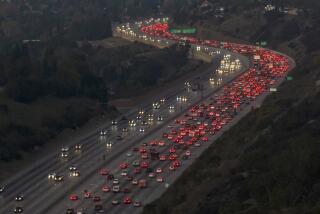City Council Continues Search for Insurance
The San Diego City Council on Monday decided to continue shopping for liability insurance, rejecting a policy that would have cost $1.2 million and provided only $3.5 million worth of coverage.
Citing the “unaffordability and unavailability” of insurance coverage, the San Diego City Council voted unanimously against paying “an absurdly high premium” for a public liability insurance policy that would only offer up to $3.5 million worth of coverage with a $3 million deductible. In 1985, the city paid $704,000 for up to $30 million coverage with a $1 million deductible. In 1984, it purchased a $157,000 policy that offered $30 million worth of coverage with a $200,000 deductible.
Instead, the city will insure itself this year by setting aside $7 million to cover all settlements. The same amount is proposed for 1987.
Meanwhile, the city will keep searching for an affordable insurance policy, said a city official.
“We are out still trying to get insurance. We aren’t giving up,” said Bruce Herring, San Diego’s director of Risk Management.
On March 13, the city’s $704,000 public liability insurance policy expired.
One reason why city officials aren’t comfortable with being self-insured is the possibility of a disaster claim settlement that could wipe out the entire $7 million, he said.
In 1985, there were 2,800 claims against the city worth $6.5 million, which is up $2 million from the previous year when 3,400 claims were made. A decade ago, nearly 2,000 claims were settled for slightly less than $500,000, according to a city manager’s report.
“It’s not so much the number of claims as the amount of claims,” he said.
Herring said that the skyrocketing premiums are the result of a two-year-old nationwide insurance industry crisis. During 1985 the industry lost $25 billion, up $4 billion from 1984.
“The $25 billion loss plus targeting cities as the deep pocket has caused problems for cities in getting insurance,” he said.
“We’re the deep pocket. If we’re only 1% at fault, we pay 100% of the damages,” he said.
The insurance crisis has caused problems for cities across the country, he said. In California alone, there are 50 cities that have either canceled their insurance or didn’t have it renewed, he said. These cities are currently self-insured, he said.
“Other cities that have been able to locate insurance companies willing to write coverages have been forced to accept higher deductibles, often ranging from $2 million to $5 million, while paying drastically higher premiums,” he said.
Herring said that other ways of dealing with the problem besides self-insurance have also been considered.
“There’s a possibility of a lot of cities pooling . . . their money together to get insurance,” he said.
Herring said the city is considering combining its resources with some of the larger self-insured cities in the state to form its own insurance company. He declined to mention which cities might be involved.
As a preventive measure to thwart claims, Herring said, city employees are being instructed on how to stop claims from being made. He said that employees are being taught “what to say and what not to say” when involved in an incident that might provoke a claim.
Although there is a risk of not having insurance and encountering a potentially disastrous claim settlement, Herring said, “Probably 90% of the claims are under $1,000.
“The most common claim is a sewer backup,” he said.
More to Read
Sign up for Essential California
The most important California stories and recommendations in your inbox every morning.
You may occasionally receive promotional content from the Los Angeles Times.










